高中英语人教版必修五Unit1 Great scientist重点短语句型复习课件(共16张PPT)
文档属性
| 名称 | 高中英语人教版必修五Unit1 Great scientist重点短语句型复习课件(共16张PPT) |
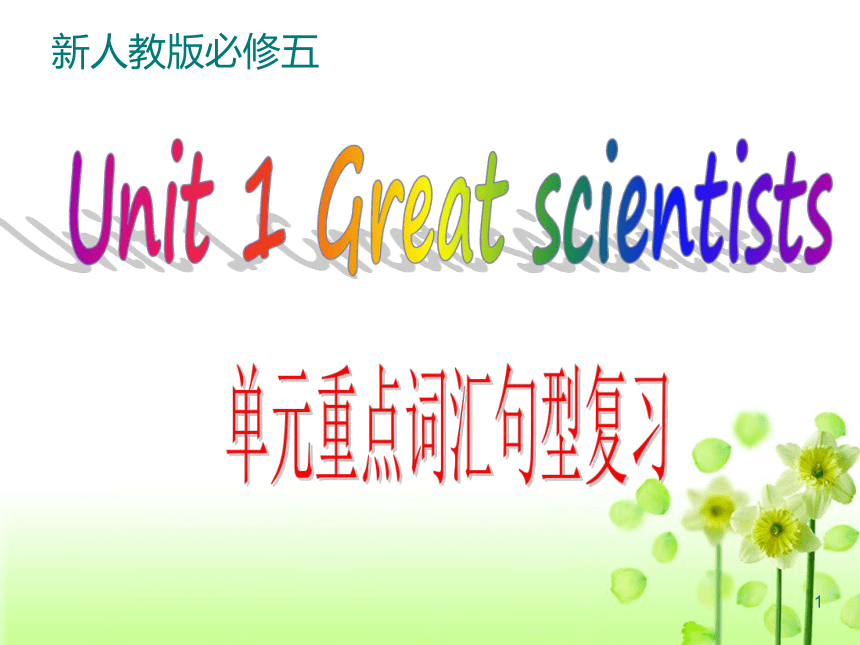
|
|
| 格式 | zip | ||
| 文件大小 | 288.7KB | ||
| 资源类型 | 教案 | ||
| 版本资源 | 人教版(新课程标准) | ||
| 科目 | 英语 | ||
| 更新时间 | 2019-12-13 00:00:00 | ||
图片预览

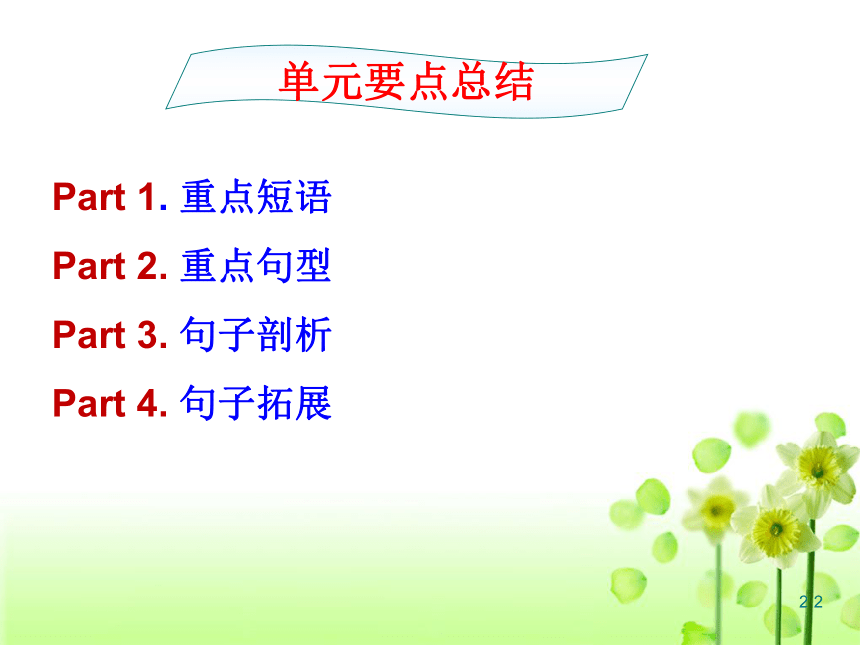
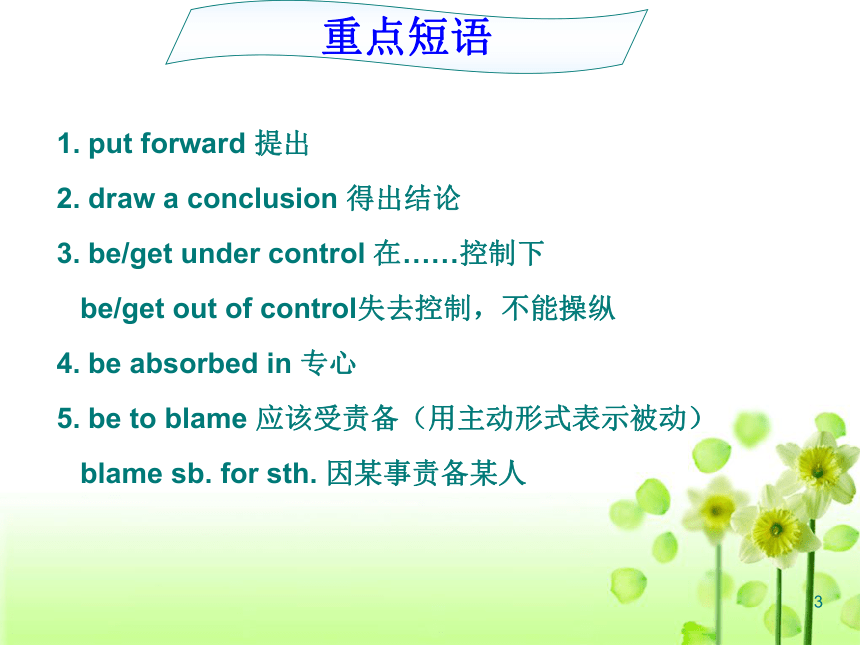
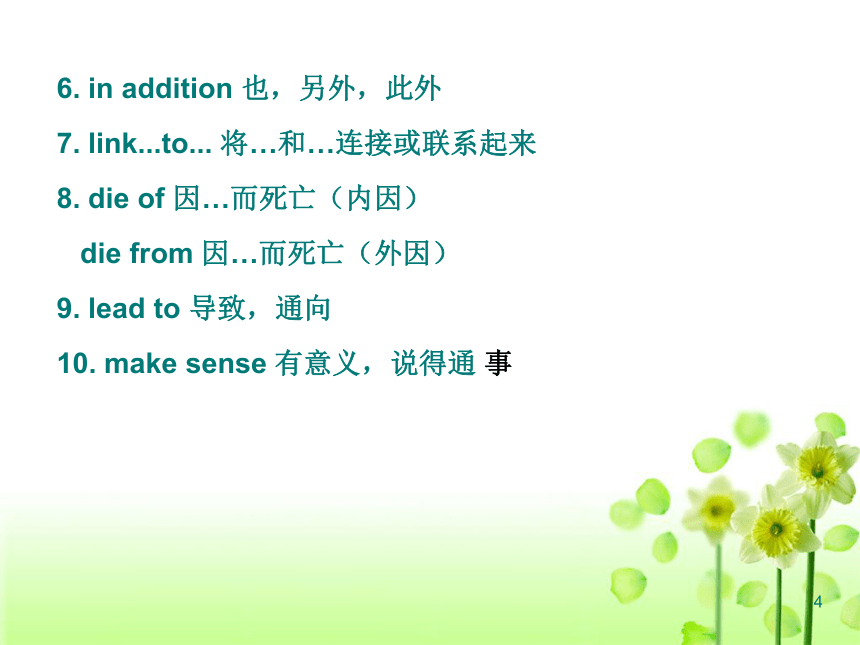
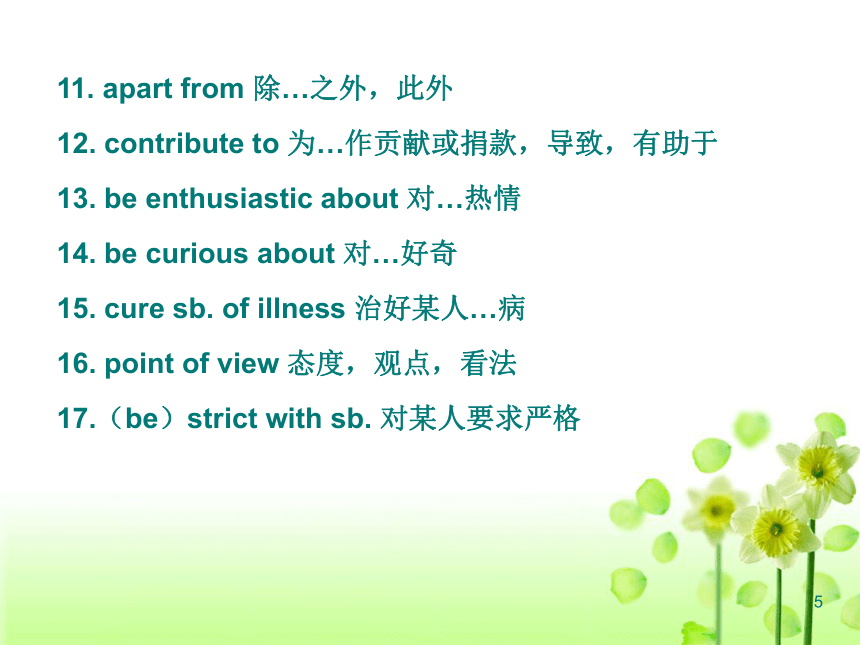
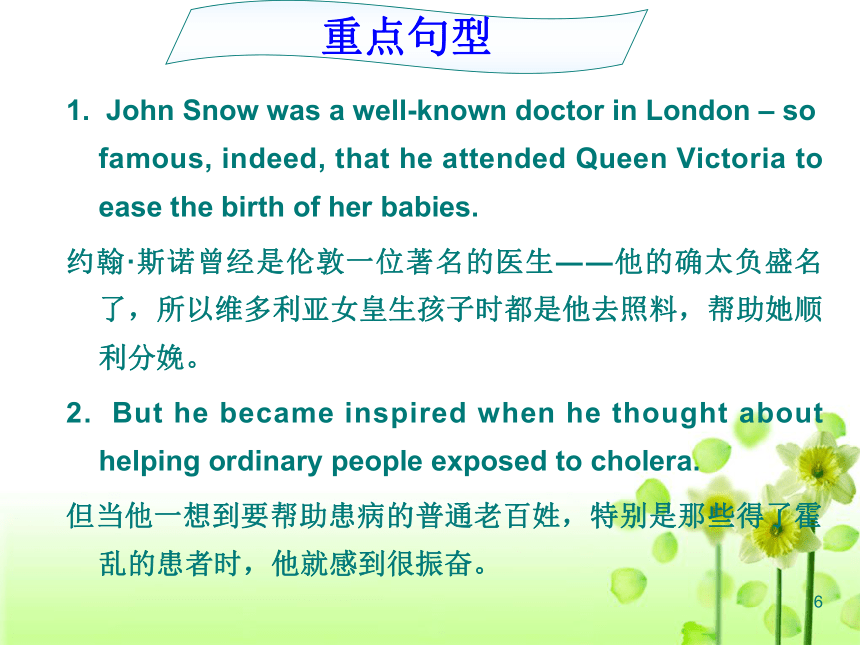
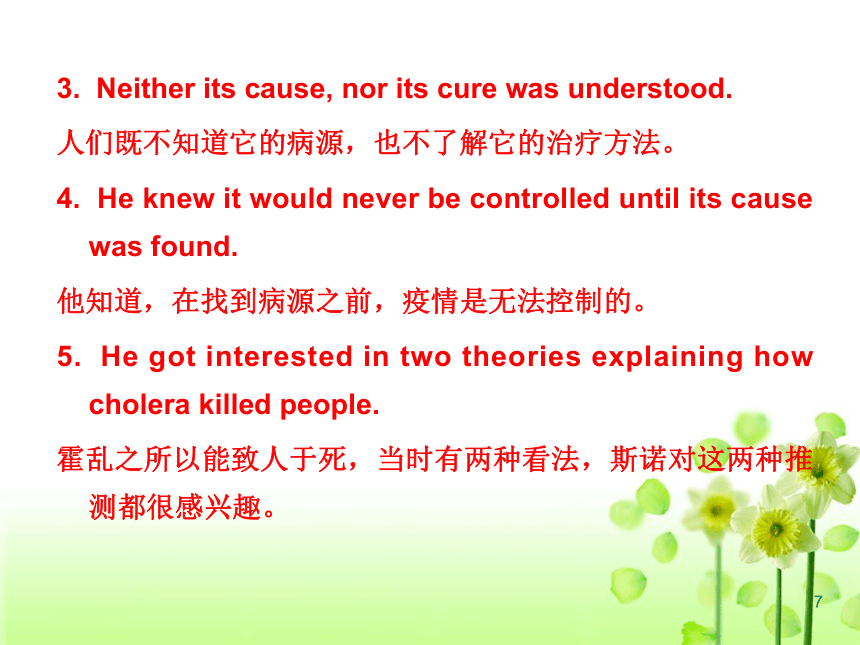
文档简介
(共16张PPT)
新人教版必修五
Unit 1 Great scientists
单元重点词汇句型复习
null
Part 1. 重点短语
Part 2. 重点句型
Part 3. 句子剖析
Part 4. 句子拓展
null
单元要点总结
null
1. put forward 提出
2. draw a conclusion 得出结论
3. be/get under control 在……控制下
be/get out of control失去控制,不能操纵
4. be absorbed in 专心
5. be to blame 应该受责备(用主动形式表示被动)
blame sb. for sth. 因某事责备某人
重点短语
null
6. in addition 也,另外,此外
7. link...to... 将…和…连接或联系起来
8. die of 因…而死亡(内因)
die from 因…而死亡(外因)
9. lead to 导致,通向
10. make sense 有意义,说得通 事
null
11. apart from 除…之外,此外
12. contribute to 为…作贡献或捐款,导致,有助于
13. be enthusiastic about 对…热情
14. be curious about 对…好奇
15. cure sb. of illness 治好某人…病
16. point of view 态度,观点,看法
17.(be)strict with sb. 对某人要求严格
null
1. John Snow was a well-known doctor in London – so famous, indeed, that he attended Queen Victoria to ease the birth of her babies.
约翰·斯诺曾经是伦敦一位著名的医生――他的确太负盛名了,所以维多利亚女皇生孩子时都是他去照料,帮助她顺利分娩。
2. But he became inspired when he thought about helping ordinary people exposed to cholera.
但当他一想到要帮助患病的普通老百姓,特别是那些得了霍乱的患者时,他就感到很振奋。
重点句型
null
3. Neither its cause, nor its cure was understood.
人们既不知道它的病源,也不了解它的治疗方法。
4. He knew it would never be controlled until its cause was found.
他知道,在找到病源之前,疫情是无法控制的。
5. He got interested in two theories explaining how cholera killed people.
霍乱之所以能致人于死,当时有两种看法,斯诺对这两种推测都很感兴趣。
null
6. The second suggested that people absorbed this disease into their bodies with their meals.
第二种看法是在吃饭的时候人们把这种病毒引入体内的。
7. He believed in the second theory but needed to prove he was correct.
他相信第二种说法,但是需要证明他是正确的。
8. It seemed that the water was to blame.
看来要归罪于饮用水了。
null
9. Immediately John Snow told the astonished people in Broad Street to remove the handle from the water pump so it could not be used.
约翰·斯诺马上叫宽街上惊惶失措的老百姓拆掉水泵的把手,这样水泵就用不成了。
10. Only if you put the sun there did the movements of the other planets in the sky make sense.
只有当你把太阳放在中心位置上,天空中其它行星的运动才能说得清楚。
null
11. But only his new theory could do that.
看是只有他的新理论才能作出解释。
12. Yet Copernicus’ theory is now the base on which all our ideas of the universe are built.
然而哥白尼的理论却是我们宇宙赖以建立的基础。
null
1.So many thousands of terrified people died every time there was an outbreak.
每当(疾病)突发时,总有成千的人死去。
【剖析】 1)本句是一个复合句,every time引导的是一个时间状语从句,意思是“每当……”,相当于“when”。 另外,此状语从句中还有一个“there be”结构。
2)So many thousands of terrified people died是主句。
null
句子剖析
【拓展】 类似的时间状语归纳:?
1)each time 每次;每当 ?
2)at the time 在……时候 ?
3)the first time 第一次
null
句子拓展
He got interested in two theories explaining how cholera killed people.?
他对两个关于霍乱为什么能致人于死地的理论感兴趣。
【剖析】 1)how 引导的特殊疑问句是宾语从句。
2)he got interestd in two theories explaining是主句。
3)主句是“主系表”结构:
get在此处为系动词,意为“变得;成为”,表示的是动态过程,get ill表示“患病;得病”。通常
be+形容词意为“病了;病着”,则表示静态,
null
句子剖析
【拓展】1)在英语中,陈述句、一般疑问句和特殊疑问句都可以在宾语从句中充当宾语。如:I don’t know what will happen in future.(由特殊疑问词引导)
I wonder whether he lives here.(由whether或if引导)
He told that he was very sad at that moment.(由that引导,that可以省略)
2)和系动词get组成的常见搭配有:
get lost(迷路);get married(结婚);get used to(习惯于);get tired(累了);get dressed(穿好衣服);get angry(发怒),等等。
null
句子拓展
2.Only if you put the sun there did the movements of the other planets in the sky make sense
只有把太阳作为(太阳系)的中心,其他星球的运动才讲得通。
【剖析】 1)if 引导状语从句表“只有”。
2)only 放在句首用来加强语气。
3)以only引导的短语作状语或状语从句放在句首时,为了加强语气,句子需要部分倒装。如:
Only by working hard can we succeed.
只有通过努力工作,我们才能取得成功。
null
句子剖析
【拓展】 1)only 后如果后续的不是状语时句子不倒装,切忌!如:
Only with him, she can do it well.她只有和他合作,才能把它做得好。
2)倒装分为全部倒装和部分倒装两种:全部倒装是指将句子中的谓语动词全部置于主语之前;部分倒装是指将谓语的一部分,如助动词或情态动词放在主语之前。如:
Then came the chairman.(全部倒装)
Never have I seen such a performance.(部分倒装)
null
句子拓展
新人教版必修五
Unit 1 Great scientists
单元重点词汇句型复习
null
Part 1. 重点短语
Part 2. 重点句型
Part 3. 句子剖析
Part 4. 句子拓展
null
单元要点总结
null
1. put forward 提出
2. draw a conclusion 得出结论
3. be/get under control 在……控制下
be/get out of control失去控制,不能操纵
4. be absorbed in 专心
5. be to blame 应该受责备(用主动形式表示被动)
blame sb. for sth. 因某事责备某人
重点短语
null
6. in addition 也,另外,此外
7. link...to... 将…和…连接或联系起来
8. die of 因…而死亡(内因)
die from 因…而死亡(外因)
9. lead to 导致,通向
10. make sense 有意义,说得通 事
null
11. apart from 除…之外,此外
12. contribute to 为…作贡献或捐款,导致,有助于
13. be enthusiastic about 对…热情
14. be curious about 对…好奇
15. cure sb. of illness 治好某人…病
16. point of view 态度,观点,看法
17.(be)strict with sb. 对某人要求严格
null
1. John Snow was a well-known doctor in London – so famous, indeed, that he attended Queen Victoria to ease the birth of her babies.
约翰·斯诺曾经是伦敦一位著名的医生――他的确太负盛名了,所以维多利亚女皇生孩子时都是他去照料,帮助她顺利分娩。
2. But he became inspired when he thought about helping ordinary people exposed to cholera.
但当他一想到要帮助患病的普通老百姓,特别是那些得了霍乱的患者时,他就感到很振奋。
重点句型
null
3. Neither its cause, nor its cure was understood.
人们既不知道它的病源,也不了解它的治疗方法。
4. He knew it would never be controlled until its cause was found.
他知道,在找到病源之前,疫情是无法控制的。
5. He got interested in two theories explaining how cholera killed people.
霍乱之所以能致人于死,当时有两种看法,斯诺对这两种推测都很感兴趣。
null
6. The second suggested that people absorbed this disease into their bodies with their meals.
第二种看法是在吃饭的时候人们把这种病毒引入体内的。
7. He believed in the second theory but needed to prove he was correct.
他相信第二种说法,但是需要证明他是正确的。
8. It seemed that the water was to blame.
看来要归罪于饮用水了。
null
9. Immediately John Snow told the astonished people in Broad Street to remove the handle from the water pump so it could not be used.
约翰·斯诺马上叫宽街上惊惶失措的老百姓拆掉水泵的把手,这样水泵就用不成了。
10. Only if you put the sun there did the movements of the other planets in the sky make sense.
只有当你把太阳放在中心位置上,天空中其它行星的运动才能说得清楚。
null
11. But only his new theory could do that.
看是只有他的新理论才能作出解释。
12. Yet Copernicus’ theory is now the base on which all our ideas of the universe are built.
然而哥白尼的理论却是我们宇宙赖以建立的基础。
null
1.So many thousands of terrified people died every time there was an outbreak.
每当(疾病)突发时,总有成千的人死去。
【剖析】 1)本句是一个复合句,every time引导的是一个时间状语从句,意思是“每当……”,相当于“when”。 另外,此状语从句中还有一个“there be”结构。
2)So many thousands of terrified people died是主句。
null
句子剖析
【拓展】 类似的时间状语归纳:?
1)each time 每次;每当 ?
2)at the time 在……时候 ?
3)the first time 第一次
null
句子拓展
He got interested in two theories explaining how cholera killed people.?
他对两个关于霍乱为什么能致人于死地的理论感兴趣。
【剖析】 1)how 引导的特殊疑问句是宾语从句。
2)he got interestd in two theories explaining是主句。
3)主句是“主系表”结构:
get在此处为系动词,意为“变得;成为”,表示的是动态过程,get ill表示“患病;得病”。通常
be+形容词意为“病了;病着”,则表示静态,
null
句子剖析
【拓展】1)在英语中,陈述句、一般疑问句和特殊疑问句都可以在宾语从句中充当宾语。如:I don’t know what will happen in future.(由特殊疑问词引导)
I wonder whether he lives here.(由whether或if引导)
He told that he was very sad at that moment.(由that引导,that可以省略)
2)和系动词get组成的常见搭配有:
get lost(迷路);get married(结婚);get used to(习惯于);get tired(累了);get dressed(穿好衣服);get angry(发怒),等等。
null
句子拓展
2.Only if you put the sun there did the movements of the other planets in the sky make sense
只有把太阳作为(太阳系)的中心,其他星球的运动才讲得通。
【剖析】 1)if 引导状语从句表“只有”。
2)only 放在句首用来加强语气。
3)以only引导的短语作状语或状语从句放在句首时,为了加强语气,句子需要部分倒装。如:
Only by working hard can we succeed.
只有通过努力工作,我们才能取得成功。
null
句子剖析
【拓展】 1)only 后如果后续的不是状语时句子不倒装,切忌!如:
Only with him, she can do it well.她只有和他合作,才能把它做得好。
2)倒装分为全部倒装和部分倒装两种:全部倒装是指将句子中的谓语动词全部置于主语之前;部分倒装是指将谓语的一部分,如助动词或情态动词放在主语之前。如:
Then came the chairman.(全部倒装)
Never have I seen such a performance.(部分倒装)
null
句子拓展
